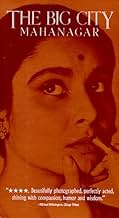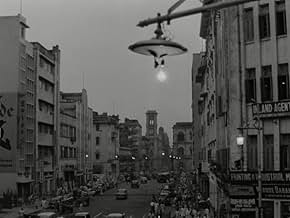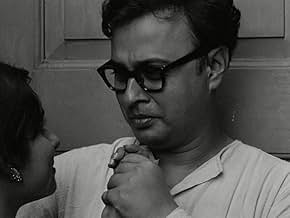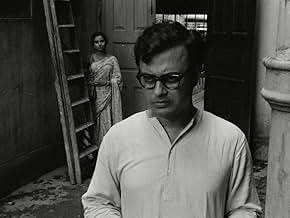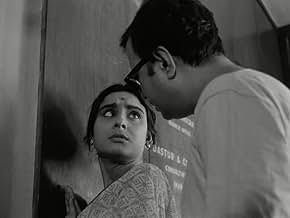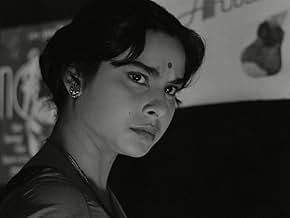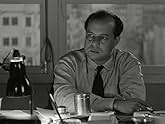Adicionar um enredo no seu idiomaLife at home changes when a house-wife from a middle-class, conservative family in Calcutta gets a job as a saleswoman.Life at home changes when a house-wife from a middle-class, conservative family in Calcutta gets a job as a saleswoman.Life at home changes when a house-wife from a middle-class, conservative family in Calcutta gets a job as a saleswoman.
- Direção
- Roteiristas
- Artistas
- Prêmios
- 4 vitórias e 1 indicação no total
- Arati Mazumder
- (as Madhabi Mukherjee)
- Bani
- (as Jaya Bhaduri)
- Sarojini (Subrata's Mother)
- (as Shephalika Devi)
- Himangshu Mukherjee
- (as Haradhan Banerjee)
- Direção
- Roteiristas
- Elenco e equipe completos
- Produção, bilheteria e muito mais no IMDbPro
Avaliações em destaque
The story follows Arati's acclimation with her job as a sales woman, her growing independence, and her new relationships with people from different social and financial classes, one example being a young Anglo-Indian colleague named Edith whom she befriends. The real conflict, however, does not happen when Arati's in-laws start a silent "cold war", but when her husband himself loses his own job and Arati becomes the sole breadwinner of the family. Subrata loses self-respect and is filled with negative feelings of inferiority and shame.
This is the story of Satyajit Ray's extraordinary classic 'Mahanagar', a poignant, quiet and moving picture which depicts a whole world of conflicts resulting from modernisation and changing social and generational norms. Ray's portrayal of the urban India, its lifestyle and people, is brilliantly done. Everything about the film is, as expected, very authentic, very real and very easily identifiable with Ray's style of film-making. He makes the proceedings and the characters very interesting and very easy to relate to.
The film deals with the struggle of middle-class families to survive in the big city through their everyday hardships, but in the process, shows the gender role conflicts and criticises the hypocrisy of traditional conservativeness. One such instance is shown when Arati's father-in-law, a retired teacher who had complained that he was in need of a new pair of spectacles, now prefers going and begging from his former student rather than accepting money from his working daughter-in-law who 'breaks tradition'.
The relationships in Mahanagar are perfectly portrayed, whether it's Arati's relationship with her husband, with her kid, with her in-laws, with her employer. But the best thing about it is the portrayal of Arati's acquaintance with her new self. Her job provides her with confidence and self-belief as she grows increasingly independent, both socially and economically. Mainly due to her friendship with the Anglo-Indian Edith, who she would later stand up for, Arati learns to use lipsticks, wear dark fashionable glasses, speak more assertively and stand up against injustice, while still maintaining her individuality as a simple, unselfish woman.
Madhabi Mukherjee is astonishing as Arati. She is a natural beauty, and acts with grace and dignity. She convincingly transforms from a simple housewife into a modern and smart woman of substance, always letting the viewer sense her struggle, confusion and pain. Anil Chatterjee is great as the slightly embittered yet loving husband. Jaya Bhaduri is completely lovable and charming in her debut role. Prasenjit Sarkar is cute as a button as Pintu. Vicky Redwood is quite nice though her line delivery is often weak. Haradhan Bannerjee is very sympathetic as Arati's boss though his character is slightly prejudiced.
Mahanagar is another example of Ray's indelible craftsmanship, of his superb storytelling and his exceptional ability to tell a universal story which is both moving and educative in a simple yet very effective way. The film's pace may be a bit slow, but it is steady enough, and the picture remains thoroughly and consistently engaging and captivating. The ending is bittersweet - sad yet optimistic, satisfying and inspiring. Mahanagar is overall a beautiful social drama; a classic and fascinating piece which is highly recommended.
We see all sorts of manifestations of duality in Mahanagar. The tension-cum-rivalry of Arati and Subrata is, of course, the most obvious manifestation. However, we also have the duality of the new- generation Arati/Subrata and the old-generation Sarojini/Priyogopal (Subrata's mother and father) and Arati, who wears traditional clothing and speaks Bengali, versus Edith, the English-speaking Anglo-Indian in Western dress. These instances of duality speak directly to the moment in which things began to make a 180-degree shift in India, when women became the breadwinners of the household and traditional gender norms became subsumed by sexual liberation.
With a leading lady as precise as Mukherjee, Ray was able wrap these complex coterminous processes up in a relatively tidy package. Mahanagar is essential viewing.
According to Roger Ebert, "the power of this extraordinary film seems to come in equal parts from the serene narrative style of director Satyajit Ray and the sensitive performances of the cast members." He described Mahanagar as "one of the most rewarding screen experiences of our time".
Ebert, as usual, is spot on. This film was a stunning surprise for me. With very few exceptions, I have found the "great" Indian films to be a let down, and the modern Bollywood film is just unbearable. This was, however, a treat and a great exploration of culture. The idea of women working and how that affects the esteem of their husbands is not unique to India, but there are certain themes -- the reaction of her father-in-law! -- that are unlike what you might see in an American film.
The Big City is a subtle, flowing work about a young housewife (Madhabi Mukherjee, who would also star in Ray's Charulata) in a middle-class family who finds a job when her father-in-law needs a new pair of spectacles. The family is very conservative, and this upsets everyone. Her husband's manhood is somewhat insulted, her father- and mother-in-law (who both live with the married couple in a rather small apartment) feel that it's just not right, and her son thinks he's been forgotten. The only one who supports her is her younger sister-in-law; she sees her as a role model. The husband (Anil Chatterjee) tries to get her to quit, but, when he loses his own job, he changes his mind quickly. Now she becomes the breadwinner, and he is effectively castrated.
This could have been a little, humble film, like many of Ray's works. But here he decides to examine a huge portion of his own culture, setting up many opposites and studying them closely. We have the husband and wife, man and woman, old-world conservatism and new-world progression, young and old, employer and employee. The list goes on. The depth of this film is nearly endless, and I'm sure it would hold up to any number of repeated viewings. The only flaw that I can see is a somewhat contrived climax - Ray had this problem in a few of his films.
I do have to give special praise to the two leads. Mukherjee and Chatterjee are just brilliant in the film. The supporting cast is also uniformly excellent.
Você sabia?
- CuriosidadesFifteen-year old Jaya Bhaduri's (later known as Jaya Bachchan) film debut and her only film with Satyajit Ray.
- Erros de gravaçãoWhen Priyogopal (Subrata's father) goes to visit his student Anupam Roychowdhury to ask for money he is shown having a conversation with Anupam in his office. When he is explaining his circumstance the camera shows him only sitting on a chair with his walking stick. In the very next scene when all the three characters are shown (third one being Anupam's wife ) the top of his walking stick has changed direction. The round bit on top was towards the right before and is turned to the left in the very next scene.
- Citações
Arati: You wouldn't recognize me on the job.
Subrata Mazumdar: What about at home? Would I recognize you at home?
Arati: You don't recognize me? Tell me honestly.
[Subrata shakes his head no]
Arati: Why not?
Subrata Mazumdar: It all feels a bit unfamiliar. It feels a bit...
Arati: What about this?
[points at her cheek]
Arati: You don't recognize my mole? I'm still the same housewife.
- ConexõesReferenced in Creative Artists of India: Satyajit Ray (1964)
Principais escolhas
- How long is The Big City?Fornecido pela Alexa
Detalhes
- Data de lançamento
- País de origem
- Central de atendimento oficial
- Idiomas
- Também conhecido como
- The Big City
- Locações de filme
- RN Mukherjee Rd, Calcutá, Bengala Ocidental, Índia(closing shot: view of the city)
- Empresa de produção
- Consulte mais créditos da empresa na IMDbPro
- Tempo de duração2 horas 16 minutos
- Cor
- Mixagem de som
- Proporção
- 1.37 : 1


